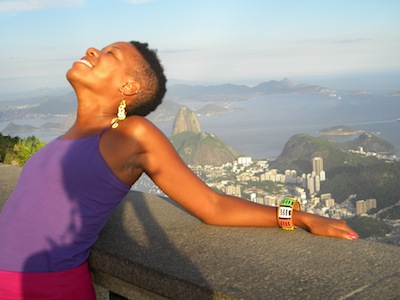I first encountered Arielle Loren when I found her article in Ebony, “The Sex-Positive Black Woman.” I then looked into her new magazine Corset, “the go-to magazine for all things sexuality.” Arielle started the magazine herself, and she’s clearly a real firecracker, so I got in touch to ask some questions.
Clarisse Thorn: Could you introduce yourself to our readers, and talk about your work?
Arielle Loren: I’m a world-traveling entrepreneur who loves sex and founded CORSET to serve as the go-to magazine for all things sexuality. We embrace curiosity, honor sensuality, and celebrate sex in all of our content and cater to an international community of readers. I’ve been featured as a sexuality writer and thought leader in major media outlets, and I also coach women how to live their best sex lives and build their best businesses.
I have heard that your magazine CORSET is generally oriented toward women of color, although of course a person of any race could get a lot out of it. Could you talk more about that?
I didn’t start CORSET to cater to any particular demographic. It just so happens that a lot of our contributors are women of color, and thus, some of our content speaks directly to them. However, we have contributors and readers of all races, ethnicities, and sexual orientations. The content really can speak to anyone. But you have to be open, and not automatically assume that there’s nothing for anyone who isn’t of color just because beautiful brown people are on the cover and in the photography. We’re not a “black” magazine. We’re not even a “women’s” magazine. We’re simply a safe space for anyone who wants to explore smart, seductive, sensitive commentary on sexuality. We aim to empower the masses, and welcome anyone to contribute and read.
The first issue of CORSET was focused on Nudity. What did you find to be the top three cultural obstacles to affirming our nude selves?
Everything from religion to eating disorders was discussed in the first issue dedicated to nudity. I found three underlying themes though in most of the articles.
- The media and the unrealistic body images of most actors, actresses, models, celebrities, etc. largely influence the public. Until we understand that most human beings don’t come in a size 2 or with a ripped pack of abdominal muscles, we’ll never be able to embrace our nude selves, look in the mirror, and truly see ourselves as beautiful.
- Our perceptions of nudity often begin in the home and in our childhood. Our readers and contributors have told so many stories of feeling ashamed of their bodies, and feeling the need to “cover up” or not affirm their nakedness. It’s not that anyone is expected to run through the streets naked beyond the age of 5, but it is to say that nudity really shouldn’t be as taboo as it is in the safe spaces of our homes. I believe the more of a “big deal” we make it in our families, the more damage we actually do to our children and each other. Not everything about nudity is sexual, which brings me to the last point.
- Nudity can be sexual. Nudity can be non-sexual. But often times, nudity is always categorized as sexual in the public at-large and even in our homes. It’s so interesting how children are given the freedom to be naked and unashamed, but somewhere in our childhoods, our naked selves become sexual and thus unacceptable. It’s a problematic paradigm, but I believe that not telling both sides of the story, nudity as sexual and non-sexual, is detrimental to our body images and self-confidence in the long run.
So what about Issue 2 of CORSET? You dedicated it to orgasms. Was there anything that you learned in particular while editing the issue?
The majority of the content in the Orgasms issue of CORSET was dedicated to the female orgasm, and thus, it generated a lot of discussion around how women achieve their orgasmic potentials and experience their best sex lives. What I really learned is that every woman is different, and only she knows how her body responds to different forms of sexual pleasure. With the Orgasms issue, we tried to provide a diversity of voices and articles, so that our women readers and their partners would have the opportunity to see themselves in some of the content and simply learn from others.
Which topics around sexuality do you find most important and exciting, and why?
I am definitely a lifetime student of all things sexuality and love learning new things. Right now, I’m really wrapped up in sacred sexuality teachings rooted in various indigenous traditions in addition to the connection between sexual energy and manifesting our deepest aspirations. It may sound really new-agey, but I truly believe that sexuality and spirituality are closely intertwined and impact our success in various social roles, including our careers and relationships. The more I’ve become tapped into my sexuality, the stronger I feel in spirit and as a human being. Sexuality is complex, and we’ll never understand all of its intricacies. But I do enjoy taking each lesson, one at a time, and sharing my findings with my readers.
Clarisse Thorn is Role/Reboot’s Sex + Relationships Editor.
Related Links:

